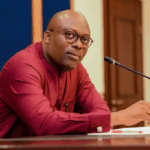L-R, Orangun of Oke-Ila, Oba Adedokun Abolarinwa; Chairman, Federal Inland Revenue Service (FIRS) and Guest Lecturer, Jack Adedeji; The Vice-Chancellor of Ilesha University, Professor Taiwo Asaolu, during the first edition of the university's Distinguished Lecture Series delivered by Adedeji at the institution on Friday.
Chairman of the Federal Inland Revenue Service (FIRS), Jack Adedeji, has said Nigeria must design a tax system that is broad-based, technology-enabled and trusted by citizens as the country's revenue challenge is not just about numbers but about structure, mindset and execution.
Adedejim made the comment while addressing the first edition of the Distinguished Lecture Series of the University of Ilesa, Osun State on Friday.
He pointed out that revenue diversification is no longer a policy priority but a national imperative.
Speaking on the theme ‘Economic Resilience in an Era of Declining Revenues’, Adedeji said it was important to restructure the productive base of the economy from crude oil and adopt a system with multiple engines of growth in agro-processing, digital economy, creative industries and solid minerals.
ALSO READ: Customer Service Week: How FIRS boss puts Nigerians first
A statement by Dare Adekambi, Special Adviser (Media) to the FIRS President, quoted Adedeji as saying: “We have made some gains, but resilience demands more than minor reforms. It requires structural transformation, bold reforms and an unwavering commitment to fiscal sustainability.
“The first pillar is the need to generate more revenue from within appropriately, efficiently and sustainably. Nigeria cannot rely on unsustainable oil revenues or foreign debt to finance development.
“We must build a tax system that reflects the true size and structure of our economy. This requires moving beyond a narrow circle of large, formal companies and capturing the economic activities of the informal sector, the digital economy and high net worth individuals living outside the tax net.”
According to him. “This also includes closing compliance gaps through stronger enforcement, simplified processes and better taxpayer education. With digital innovations like TaxPro Max, e-Tax Clearance Certificate and Tax Intelligence, FIRS is already paving the way to automate compliance and make tax administration smarter and more data-driven. Raising domestic revenue is not just a fiscal function, it is a nation-building strategy.”
He said that FIRS, as the country's central tax authority, was already helping Nigeria transform from weakness to strength.
“FIRS is not just a tax collector. It is a strategic institution at the heart of Nigeria’s financial stability agenda, and it is undergoing one of the most profound transformations in its history.
“To rebuild public confidence in the tax system, we are not only modernizing our systems but also modernizing our mindset and culture towards greater professionalism, integrity and service orientation.
“FIRS is not waiting for flexibility to be handed to it. We are building it from the ground up. Through automation, legal reform, multi-level collaboration and institutional renewal, we are laying the fiscal foundation for a Nigeria that can weather storms, adapt to change and sustain growth,” he added.
Speaking earlier, the institution's Vice-Chancellor, Professor Taiwo Asaolu, said the two-year-old institution aims to use public lectures as a platform to discuss global and national issues, as well as seek lasting solutions to the country's economic challenges.










